

Le PLQ et l’éducation : Performance, gouvernance, arrimage emploi-travail et autres « perspectives d’avenir » pour le système d’éducation québécois. Introduire la coopération dans la pédagogie. L’école publique doit être le lieu où l’on apprend les enseignements fondamentaux mais sa mission civique est également de former des citoyens libres, éclairés et lucides qui sauront faire prévaloir les exigences de la raison et de la conscience face à l'état actuel de la Terre.
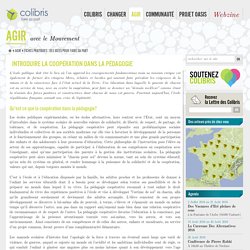
Une éducation dans laquelle le pouvoir de chacun est au service de tous, avec au centre la coopération, peut faire se dessiner un "demain meilleur" comme étant la réunion des forces positives et constructives dont chacun de nous est pourvu. Pourtant aujourd’hui, l’école républicaine française connaît une crise de légitimité. Letableau_v4_no1_2015_01_26_0.pdf. The Future of Education. 25 Trends Disrupting Education Right Now. 25 Trends Disrupting Education Right Now by Terry Heick Disruption doesn’t sound like a pretty word, but in the long run, it can be a beautiful thing.
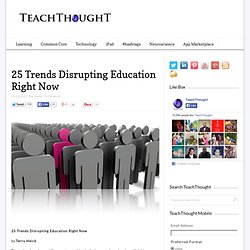
Disruption is about shifting power. Eroding patterns. Breaking the system. In education, this can come from the most unlikely of sources. In these cases, small moves via modest platforms create large ripples. It isn’t always from the most powerful technology, the most noble intents, or even the best ideas that disrupt. So we’ve created a scale. It is not meant to be exhaustive, and it’s absolutely subjective, but maybe we’ll be lucky enough that it might spark a conversation.
And it is through informed conversation that more disruption can grow. Note that this is not intended to be an evaluation of the quality of each of these initiatives. Re-balance power. And catalyze new learning forms. 20th Century Assessment In A 21st Century Learning Environment. 20th Century Assessment In A 21st Century Learning Environment by Terry Heick Testing is a major challenge in education.
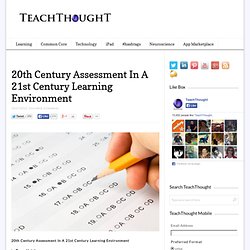
Agreeing on what’s to be tested and how it’s to be administered is a matter of much debate. It’s also a big business. According to SmarterBalanced.org, the per-student cost for testing is currently around $31 per student. Recently there has been movement in this area, with a slew of organizations– among them the Smarter Balanced Consortium linked to above–developing new approaches to assessing student understanding. These efforts include adding adaptive computer-based testing to the existing assessments forms, which in many states include short-written responses. 9 Characteristics Of 21st Century Learning. The label of “21st Century learning” is vague, and is an idea that we here at TeachThought like to take a swing at as often as possible, including: –weighing the magic of technology with its incredible cost and complexity –underscoring the potential for well thought-out instructional design –considering the considerable potential of social media platforms against its apparent divergence from academic learning.
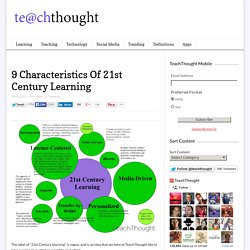
How 21st Century Thinking Is Just Different. How 21st Century Thinking Is Just Different by Terry Heick This content is proudly sponsored by The Institute for the Habits of Mind, promoting the development of personal thinking habits in 21st century learners.

In an era dominated by constant information and the desire to be social, should the tone of thinking for students be different? After all, this is the world of Google. In this world full of information abundance, our minds are constantly challenged to react to data, and often in a way that doesn’t just observe, but interprets. As a result, the tone of thinking can end up uncertain or whimsical, timid or arrogant, sycophant or idolizing–and so, devoid of connections and interdependence. The nature of social media rests on identity as much as anything else—forcing subjectivity on everything through likes, retweets, shares, and pins.
But this takes new habits. Information Abundance Persisting. Managing impulsivity. Responding with awe. Questioning. Rethinking Grading In A 21st Century Project-Based Learning Environment. Rethinking Learning: The 21st Century Learner. The role of informal learning is often discussed–as it is below–in terms of how it can promote improved formal learning performance.
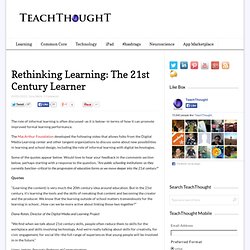
The MacArthur Foundation developed the following video that allows folks from the Digital Media Learning center and other tangent organizations to discuss some about new possibilities in learning and school design, including the role of informal learning with digital technologies. Some of the quotes appear below. The Inside-Out School: A 21st Century Learning Model.
The Inside-Out School: A 21st Century Learning Model by Terry Heick As a follow-up to our 9 Characteristics of 21st Century Learning we developed in 2009, we have developed an updated framework, The Inside-Out Learning Model.
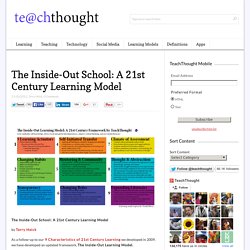
The goal of the model is simple enough–not pure academic proficiency, but instead authentic self-knowledge, diverse local and global interdependence, adaptive critical thinking, and adaptive media literacy. By design this model emphasizes the role of play, diverse digital and physical media, and a designed interdependence between communities and schools. 22 Things We Do As Educators That Will Embarrass Us In 25 Years. 22 Things We Do As Educators That Will Embarrass Us In 25 Years by Terry Heick Saw a picture today from the 1970s of a mother driving her car with her newborn baby in the passenger seat (no car seat).
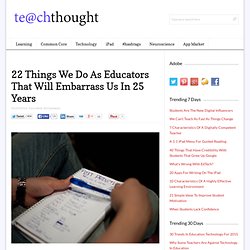
This, like pretty much everything else, got me thinking about education. What do we do now that in 25 years we’ll look back on and shake our heads? What are our “doctors smoking cigarettes while giving check ups” moments? 22 Things Education Does That Will Embarrass Us In 25 Years 1. And were confused when we couldn’t properly untangle them. 2.
Portail:Technologies de l'information et de la communication pour l'enseignement. 9 nouveaux MOOC pour se former au Web et au numérique - Educavox. 21st Century Schools. L'école inversée, un concept parti «d'en bas» bientôt au top. Internet a donné une nouvelle jeunesse et un nouvel élan à l'inversion du temps des devoirs (en classe) et des leçons (à apprendre à la maison).
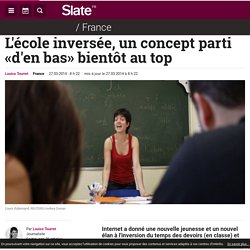
L’innovation est une «vieille» tradition scolaire. Certaines pédagogies sont éternellement «nouvelles», Mais certaines nouveautés vraiment plus nouvelles mérite qu'on s'y arrête. The Future of Education. The learning design studio: collaborative design inquiry as teachers’ professional development. Yishay Mora* and Orit Mogilevskyb aInstitute of Educational Technology, The Open University, Milton Keynes, UK; bTechnologies in Education Program, The University of Haifa, Haifa, Israel Abstract The learning design studio is a collaborative, blended, project-based framework for training teachers in effective and evidence-based use of educational technology.
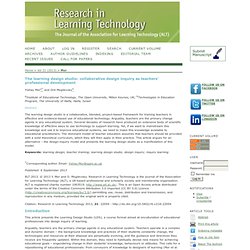
Arguably, teachers are the primary change agents in any educational system. Several decades of research have produced an extensive body of scientific knowledge of effective ways to use technology to support learning. Keywords: learning design; teacher training; learning design studio; design inquiry; inquiry learning *Corresponding author. Published: 6 September 2013 RLT 2013. © 2013 Y. «Oui, je connais Justin Bieber et j'ai un iPod !» Photo : Joannie Lafrenière J’enseigne au secondaire depuis 1978. J’ai enseigné à peu près toutes les matières : français, anglais, musique, écologie, morale, mathématiques, dans une douzaine d’écoles, dans des centres pour décrocheurs et pour délinquants, dans des classes enrichies, en formation professionnelle, en récupération scolaire et en orthopédagogie.
About OCW. Age of Innovalesque: Replacing Education with Innovation: Kwela Sabine at TEDxBilbao. Microsoft Word - Pedagogy2.0 Final FR.doc - Pedagogy2.0-FR.pdf. Enseigner, former, éduquer. Rethinking Learning: The 21st Century Learner. Digital Natives. Les risques intellectuels et l'apprentissage. Qui ne risque rien, ne gagne rien Imaginez que vous venez tout juste de décrocher votre diplôme et que vous êtes particulièrement doué en physique et en mathématiques. Vous n'arrivez pas à trouver du travail dans une université, alors vous accepter un travail inférieur dans un bureau de brevets mais continuez de réfléchir à vos idées de recherche. Malgré vos frustrations sur le plan du travail, vous persistez dans vos recherches et mettez éventuellement de l'avant une nouvelle théorie audacieuse.
Cependant, vos idées se buttent à des critiques persistantes chez vos collègues. Si vous croyez avoir déjà entendu cette histoire, vous avez probablement raison. ApprendreAutrementAut12. BRAVO! Merci de votre TRÈS beau partage! Je vous FÉLICITE! Oui, je sais qui vous êtes :-).BRAVO! Section 1 : Qu'est-ce qui est nouveau avec ces technologies dites " Web 2.0", "Apprendre 2.0" ou " 21st century learning"? Le Web 2.0, c'est des applications que nous retrouvons sur le Web que nous n'avons pas à installer.
Les applications Web 1.0, quant à elles, doivent être installées sur notre ordinateur si nous désirons y avoir accès. Les applications Web 2.0 ne sont donc pas liées à l'ordinateur. CenturyLearningVideoMacArtheur. SirKenRobinson_2006-480p-fr.mp4 (Objet video/mp4) Sugata Mitra: The child-driven education. Marc Prensky - What is the role of the teacher in todays world? A Vision of Students Today. A vision of students today - 8 Translation(s) A Vision of K-12 Students Today - 4 Translation(s) What Does it Mean to be Literate in the 21st Century? (short version 8 min) Web 2.0 & Language Learning. Avez-vous remarqué? (Pay attention in French, en français)
Information Services and Technology - Michael Wesch and the Future of Education. Le changement de paradigme du système d'éducation.